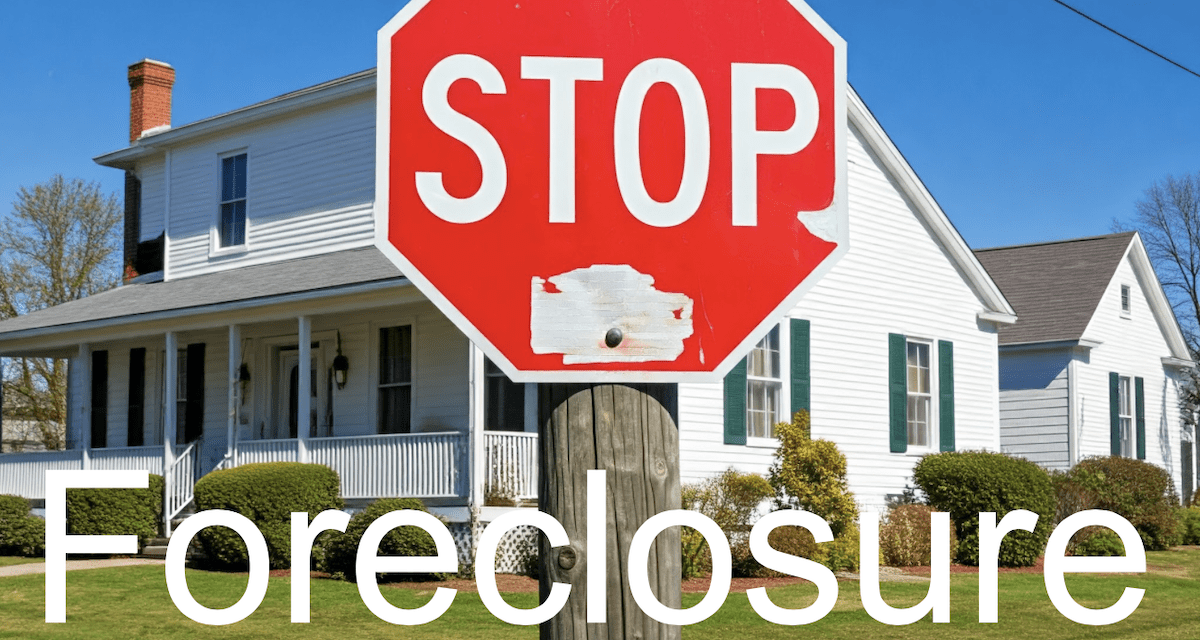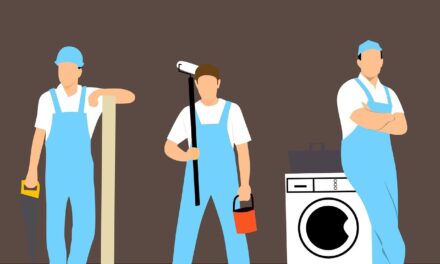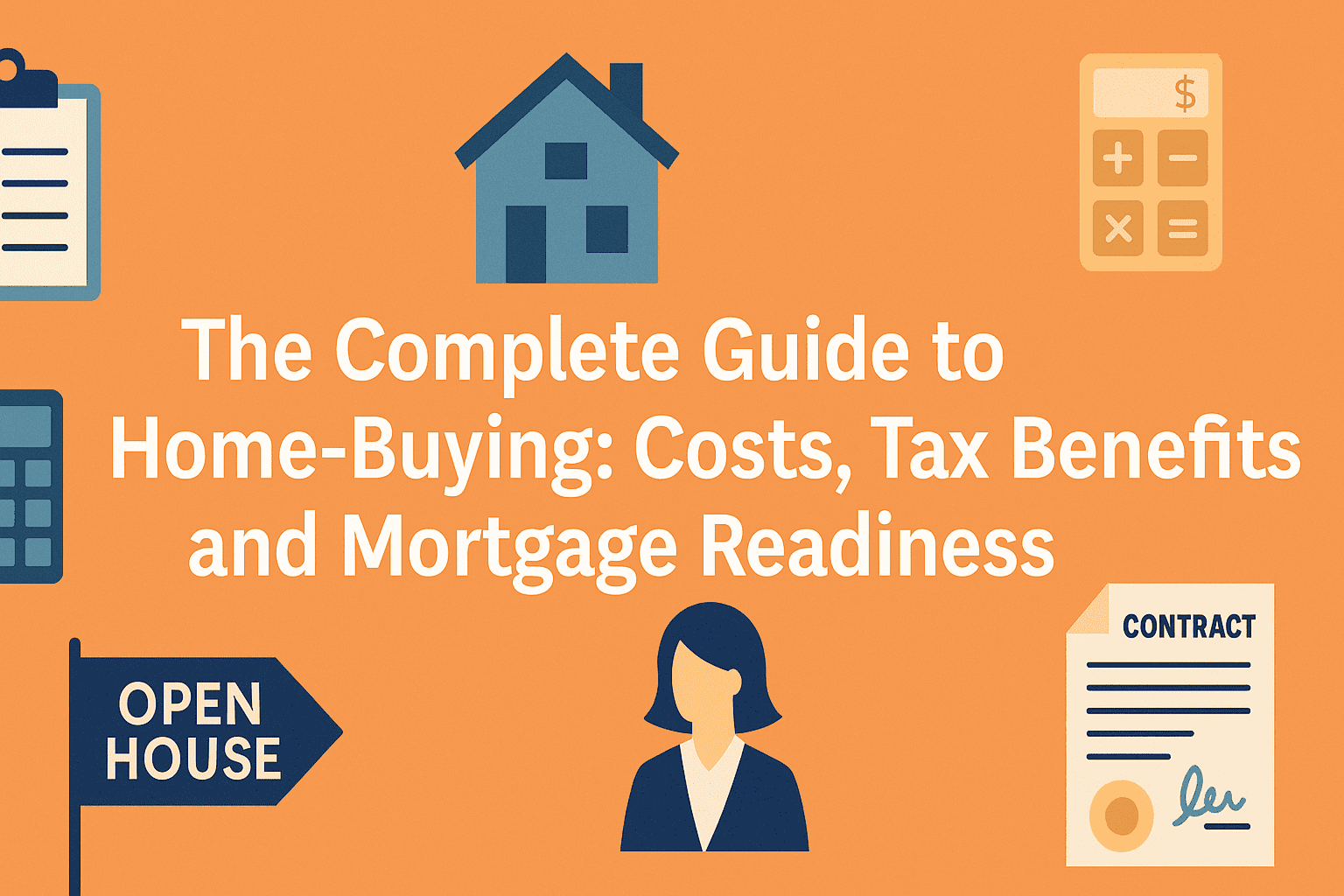Late with your mortgage payments? Don’t ignore the notices from your lender. If your home loan lender has started foreclosure, stop it now with our best tips. This article discusses the options you have available even in the eleventh hour. It’s extremely important that you take a proactive role in finding a solution to losing your house.
If you find yourself in a situation where you can not make your mortgage payments but still have adequate income, you have options. If your source of income is no longer viable e.g. you lost your job, that’s a more difficult path to navigate. I will attempt to address both situations in this article.
You are behind but are still employed.
This assumes you still have a source of income sufficient to make your payments in the future. You and/or your spouse are gainfully employed and can produce tax and other documents to prove you are gainfully employed. Perhaps you had unexpected medical bills, a death in the family, or other good reasons for not making your mortgage payments.
Your failure to make the mortgage payments was a matter of choice rather than not having sufficient funds. This is very important to a mortgage lender.
The mortgage company will usually work with a borrower to create a loan modification or a repayment plan to avoid a foreclosure sale. Lenders do not want to be in the real estate ownership business. All your lender wants is to receive monthly payments on time each month.
Pre-foreclosure or Forbearance
This is the process discussed above where the borrower informs the lender that they are having financial problems and will not in the near future be able to make payments. If the lender agrees they will put the payments into forebearance. This means they will not take foreclosure action as long as the house is offered for sale.
You can help yourself by making payments on time until the house is sold. This will keep your credit in good standing since the lender has nothing to report. If you need to borrow the money to keep your payments up, it may be a good idea since the house is for sale and there is equity coming to you when sold.
1. Loan Modification:
- Interest Rate Reduction: Lowering the interest rate can reduce monthly payments.
- Term Extension: Extending the loan term can lower monthly payments by spreading the debt over a longer period.
- Principal Reduction: Reducing the principal balance can lower monthly payments.
- Forbearance: Temporarily pausing or reducing mortgage payments for a set period.
2. Reinstatement:
- Payment Plan: The lender might agree to a payment plan where the debtor pays off the past-due amount over a specified period.
- Resume Regular Payments: Once the past-due amount is paid, the debtor can resume regular monthly payments.
3. Mortgage Assistance Programs:
- Government Programs: Some government agencies offer assistance programs that can help homeowners avoid foreclosure.
- Non-Profit Organizations: Many non-profit organizations provide financial counseling and assistance to homeowners in need.
Because you do have sufficient income to make your payments and you are in the pre-foreclosure proceedings, more options are available. Your best option is to immediately contact your lender and discuss options. When I say immediately contact the mortgage servicer, I mean as soon as you finish reading this article.
The loan servicer will run your credit score and discuss your missed payments. They will want to be assured you can actually make future monthly mortgage payments. You will explain how you are in a temporary financial hardship that has caused you to miss the payments.
Provide the mortgage servicer with sufficient documentation to prove your case. This will include sending copies of recent payroll checks, bank statements, and more. The process may be somewhat similar to the time when you purchased your house.
The loan servicer will halt the foreclosure action during the work out
Once the loan servicer has had time to review your documentation they will if the information is favorable put an automatic stay on the foreclosure action. Ultimately, the mortgage servicer will create an agreement whereby you can get back to a regular monthly mortgage payment.
The plan usually involves modifying the mortgage loan by adding the unpaid amounts to the back of the loan. There are variations on this and one can be that you will make a regular mortgage payment plus an additional amount each month. When you have caught up with the arrears amount, your payment will drop.
Your financial situation will be closely monitored by the mortgage servicer. They will pull your credit report periodically to make sure you are not falling behind with other payments such as credit cards. All of this activity will not be free. Not only will the mortgage debt you agreed to pay still be there but there are fees and late charges to deal with.
All of these will be added to your loan. Most people never pay off their home over the 30 years allocated. When you sell your home, the equity will pay the amount that was added to the back of the loan.
Another option that the lender may work out with you is offering you a lower interest rate as long as you are no longer having financial problems. A job loss for example can change the deal.
A lender may want to create a new mortgage in the long term. If you have been paying on your mortgage for 10 years with 20 remaining, recasting the loan to 30 years can bring the payments down. Your mortgage terms can be changed as well.

You are behind on your mortgage payments and have lost your income.
There are fewer options available to you under this scenario. It’s very important that you recognize your situation and resolve to take steps immediately while you have options. Mortgage servicers want to work with customers who can afford to make monthly payments in the future. If you are out of work or have in some way lost your source of income, you can still do better than allowing a foreclosure.
Without a source of income, you have no ability to make payments. This leaves the lender with only one action to be taken and that is to foreclose on your property. Since you know that it’s time to move out of your primary residence, consider a couple of options. The first option will help your credit down the road. The process is called a “deed-in-lieu of foreclosure”.
Deed in Lieu of Foreclosure
A deed in lieu of foreclosure is a legal agreement where a homeowner voluntarily transfers ownership of their property to the lender in exchange for avoiding foreclosure proceedings. It’s essentially a mutual agreement between the homeowner and the lender to terminate the mortgage debt.
How It Works:
- Agreement: The homeowner and lender agree to the deed in lieu arrangement.
- Transfer of Ownership: The homeowner signs a deed that transfers title of the property to the lender.
- Debt Release: In exchange for the property, the lender releases the homeowner from any remaining mortgage debt.
Benefits of a Deed in Lieu:
- Avoid Foreclosure: By agreeing to a deed in lieu, homeowners can avoid the negative consequences of foreclosure,such as damage to their credit score and potential eviction.
- Quicker Resolution: A deed in lieu can often be completed more quickly than a foreclosure process.
- Reduced Financial Burden: In some cases, a deed in lieu can help homeowners reduce their overall financial burden by avoiding foreclosure costs and potential deficiency judgments.
Important Considerations:
- Tax Implications: A deed in lieu may have tax implications for the homeowner. It’s essential to consult with a tax professional to understand the potential consequences.
- Credit Impact: While a deed in lieu is generally less damaging to credit than a foreclosure, it can still have a negative impact.
- Negotiation Process: The deed in lieu process may involve negotiations between the homeowner and the lender. It’s important to work closely with a real estate agent or attorney to ensure a favorable outcome.
If you’re considering a deed in lieu, it’s highly recommended to consult with a qualified real estate agent or financial advisor. They can provide guidance and support throughout the process.
A deed-in-lieu of foreclosure means that you sign over your home to the mortgage holder. This permits the mortgage holder to take possession of your property without going through the expense of hiring a foreclosure attorney and paying court costs. You benefit because there was no foreclosure.
You will have the debt on your credit report but that’s better than a foreclosure. The outcome is bad but it could be worse. The lender will give you time to vacate the property.
Short Sale: A Brief Overview
A short sale is a real estate transaction where the seller (usually a homeowner) sells their property for less than the outstanding mortgage debt. This typically occurs when the property’s market value has decreased below the amount owed on the mortgage.
How Short Sales Work:
- Financial Hardship: The homeowner must demonstrate financial hardship, such as job loss, medical expenses, or divorce, to qualify for a short sale.
- Short Sale Request: The homeowner submits a request to their lender, detailing their financial situation and the proposed sale price.
- Evaluation: The lender evaluates the request and determines whether the proposed sale price is reasonable based on the property’s market value.
- Negotiations: If the lender approves the short sale, negotiations begin between the lender, the homeowner, and the buyer to determine the final sale price.
- Closing: Once an agreement is reached, the property closes, and the lender receives the proceeds of the sale.
Benefits of Short Sales:
- Avoid Foreclosure: Short sales can help homeowners avoid the negative consequences of foreclosure, such as damage to their credit score and potential eviction.
- Quicker Resolution: Short sales can often be completed more quickly than foreclosure proceedings.
- Reduced Financial Burden: By selling the property for less than the mortgage debt, homeowners may be able to reduce their financial burden.
Important Considerations:
- Tax Implications: Short sales may have tax implications for the homeowner. It’s essential to consult with a tax professional to understand the potential consequences.
- Credit Impact: While short sales are generally less damaging to credit than foreclosure, they can still have a negative impact.
- Negotiation Process: The short sale process can be time-consuming and stressful. It’s important to work closely with a real estate agent and lender to ensure a smooth transaction.
If you’re considering a short sale, it’s highly recommended to consult with a qualified real estate agent or financial advisor. They can provide guidance and support throughout the process.
Contact a real estate agent, explain that you want to do a short sale and can the real estate agent handle it. Assuming that the real estate agent is on board, that person will contact your lender and tell the lender that they have a contract for the listing and sale of the property.
Usually, mortgage companies want their money in the most efficient manner. A short sale should make sense to them. They will stop the foreclosure process and provide time for the house to be sold.

Foreclosure action stops during short sale process
No legal action will be taken during this period and you will not be expected to make payments. The mortgage lender must agree to the selling price. The lender must also agree to any offer that you want to accept. As the “owner,” you are still the one working with the real estate agent to get the house sold.
More often the lender will accept the offer if it is reasonable. The property may be advertised as a short sale so lower offers are to be expected.
The consequences of a short sale are better than almost any other solution that involves you giving up the property. A short sale will permit you to buy and finance a new property in as few as two years. A short sale is not a foreclosure. Those late payments will stand out and it will take several years for them to fade away and permit your credit score to recover.
None of the solutions that I have discussed above require a bankruptcy lawyer as lenders are usually eager to work with customers who have missed mortgage payments. They want nothing more than to see your status return to “good standing” with them. Some will even wave late fees.
Nonrecourse mortgage
Take a look at your mortgage documents, the note, and the trust deed. If your loan is a “non-recourse” loan which most home mortgages are, this means the lender can not come after you if you are foreclosed on. Should the lender sell your house for less than you owe, the non-recourse clause prevents them from suing you for the loss.
Not all loans have non-recourse. Those without non-recourse can sue you for the shortfall in the sale plus costs. This adds insult to injury unless you take one of the actions above approved by the lender.
Second mortgage
A second mortgage loan takes a second position behind the first mortgage. This means if you are foreclosed upon by the first mortgage, the second will lose their investment unless they buy out the balance from the first mortgage. Often a second mortgage holder will simply allow the property to get foreclosed because they do not want a further investment in a clear loss already.
You need to negotiate with the second mortgage holder in the same way as the first mortgage holder. Try to get them to put funds on the back if you are still working.
If you are unemployed, there are options that you can work out with the second mortgage holder short of filing for bankruptcy where they will stand to lose everything. It’s best to work out a situation that you can live with.
Bankruptcy no solution
Bankruptcy is not a perfect solution that many should consider unless they owe a debt to many others and the amounts are substantial. Why? The courts can not absolve a mortgage loan debtor of the debt. The amount borrowed from the first mortgage holder must be repaid in some way.
A judge has little latitude in this area. Even filing a Chapter 13 bankruptcy with a 3-5 year plan calls for full repayment of the debt owed to the mortgage holder. The primary thing to remember is that the mortgage holder must agree to any plan offered by the bankruptcy lawyer for the debtor. The mortgage holder can not be compelled to agree to a repayment plan.
Unsecured debt such as credit cards can be wiped out or the debtor will be required to repay the money over time. A second mortgage while secured is different than a first mortgage and judges have more latitude including wiping this debt completely.
Example of actual situation
This is an example of someone who filed bankruptcy exclusively to save his house. There were one or two small items added to the filing but nothing of consequence. He was told by an attorney that filing for Chapter 13 or Chapter 7 would stop the foreclosure process.
As it happens the property was to go for sale at the courthouse the next day and the filing stopped the process. The case dragged on for two months and the judge declared that based on documentation the debtor could afford to make payments. Just before the first payments were due, the debtor’s attorney filed for dismissal of the bankruptcy.
The lender immediately posted in the newspaper a notice of foreclosure. It takes a month for this notice. Again the day before the sale at the courthouse, the debtor filed again for Chapter 13. The process was stopped for another two months.
The judge stated that if payments were not made on time she would rescind the bankruptcy. The debtor failed to make a payment to the court-appointed trustee. The trustee was compelled to file a notice to rescind the bankruptcy which was approved by the Judge.
Debt kept piling up
Where did that put the debtor? Over the almost two years that this process played out, debt was accumulating along with late fees and then attorney and court fees.
The mortgage debt climbed month by month. Finally, the house was sold at the courthouse. There was equity in the house that was entirely eaten up with fees etc. To make matters worse the debtor was required to pay his attorney and fees to the court trustee to pass along a couple of payments.
As I mentioned above, bankruptcy will not absolve a debtor of the amount owed. Almost all mortgages permit the lender to recover costs for court, collection, and expenses. The lesson here is that yes, a bankruptcy filing will stop a bankruptcy but it can come with a big cost. Why not work with the lender instead and save money? In the example above, the borrower made no attempt to work with the lender.
Wraparound Mortgage an option for the unemployed owner
When you think all is lost, consider hiring a real estate agent and selling your house while retaining the mortgage. This is called a wraparound mortgage. It’s unconventional but they work to help avoid a foreclosure. The owners usually move but the upside can be a gain in equity and the resolution of credit issues.
Using a Wraparound Mortgage to Avoid Foreclosure
A wraparound mortgage is a type of financing arrangement where a new lender provides a loan that encompasses both the existing mortgage debt and additional funds. This can be a strategy to avoid foreclosure, but it’s important to understand the risks and benefits before considering it.
How a Wraparound Mortgage Works:
- New Loan: A new lender provides a loan that covers the outstanding balance of the existing mortgage, plus any additional funds the borrower needs.
- Assumption of Existing Debt: The new lender essentially assumes the existing mortgage debt.
- Single Monthly Payment: The borrower makes a single monthly payment to the new lender, which covers both the existing mortgage and the new loan.
Benefits of a Wraparound Mortgage:
- Avoid Foreclosure: It can be a way to avoid foreclosure by providing a new financing option.
- Lower Interest Rate: In some cases, the new lender may offer a lower interest rate than the existing mortgage, resulting in lower monthly payments.
- Flexibility: Wraparound mortgages can offer more flexibility in terms of repayment terms and conditions.
Risks of a Wraparound Mortgage:
- Higher Risk for Lender: Because the new lender is assuming the risk of the existing mortgage, they may charge a higher interest rate to compensate.
- Complexity: Wraparound mortgages can be more complex than traditional mortgages, and there may be additional fees involved.
- Limited Availability: Not all lenders offer wraparound mortgages, and they may be more difficult to obtain.
Before considering a wraparound mortgage, it’s essential to consult with a qualified financial advisor or mortgage professional. They can help you assess your options, understand the risks and benefits, and determine if a wraparound mortgage is the right choice for your situation.

Your Credit
Probably the last thing you are thinking about when trying to avoid losing your house is your credit score. This should be a key consideration. Without a good credit score in the future, your costs to borrow, get insurance and more will be affected. Choosing an option that can prevent a foreclosure on your record and allow for credit repair over time may be the best course.
I learned years ago that a short sale for example was less damaging than not making payments. True, payments over 30 days are one of the worst marks on your credit report and they stay a while. If you can make payments while you are working out a short sale you will end up with a fairly good credit score when the house is sold.
The same situation is true for a forbearance. Keep making payments on time if it’s possible.
Refinance your house
I had to dive into this for those of you with equity in your home. If you have lost your source of income and you do not expect it to return for some time, why waste your equity? Take immediate steps to sell your house and rent an apartment or house until your life improves.
Using up your equity can be a terrible waste of valuable currency. Cash is king and you need to preserve it as much as possible. There is an old saying “throwing good money after bad”. It like gambling. You are losing so your raise the bet to win and keep losing.
Retirement/401k
Avoid using your hard earned retirement fund to bail out a situation that you have no control over. If your problems are short term meaning a few months, borrowing from your 401(k) if you are employed may be a solution. If you have lost your source of income, leave that 401(k) alone. It takes discipline to refrain from robbing the retirement funds but it’s critical that you leave those funds alone.
Resist the temptation to use your retirement fund to fix problems. Open a ROTH IRA and use that fund to support short term issues. There are no penalties.
5 Resources to Prevent Foreclosure
- HUD-Approved Housing Counseling Agencies: These agencies offer free or low-cost counseling on various housing-related issues, including foreclosure prevention. They can provide guidance on options like loan modifications, forbearance, or repayment plans.
- National Mortgage Settlement (NMS) Program: If your mortgage was originated between 2008 and 2011, you may be eligible for relief through the NMS program. This includes options like loan modifications, refinancing, or principal reduction.
- Housing Counseling Hotline: Dial 1-888-995-HOPE to connect with a housing counselor who can provide information and assistance.
- Local Legal Aid Offices: These organizations often offer free or low-cost legal advice and representation to individuals facing foreclosure.
- Your Mortgage Lender: While it may seem counterintuitive, your lender may also be able to help you avoid foreclosure. They may offer options like loan modifications or forbearance plans.
Please leave a review of this article. We appreciate your comments including topics for future articles. RetireCoast is not offering legal advice. We encourage you to seek the assistance of an attorney anytime you believe you need one. Work with your CPA on tax consequences of your decisions.

Rent vs. Buy: A Practical Housing Decision for Millennials – RetireCoast
- Rent vs. Buy: A Practical Housing Decision for Millennials
- Weapons Used In 1776: Revolutionary War Weapons, Tools, and Uniforms
- Shamrock Shenanigans and Southern Charm: A Guide to St. Patricks Day on the Mississippi Gulf Coast
- Who We Were in 1776: The People Who Became Americans
- 11 Best 2026 Tax Changes Millennials and GEN Z Should Understand NOW!
Discover more from RetireCoast.com
Subscribe to get the latest posts sent to your email.









